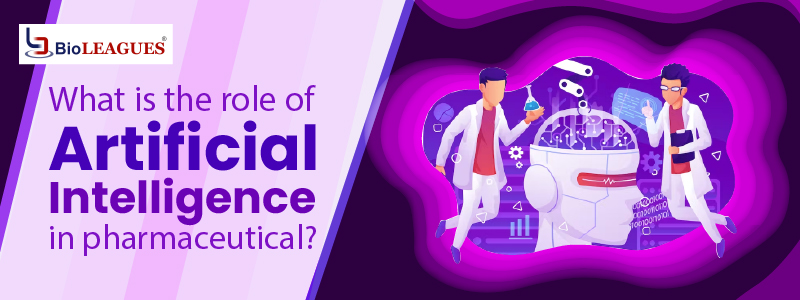Role of Artificial in the Pharmaceutical Industry.
With Artificial Intelligence becoming a part of our daily life it is no surprise that the projected market volume would reach up to 10 billion dollars by 2024 which includes AI in pharmaceutical and biotechnology.
The pharmaceutical industry has been noticeably increasing its implementation of AI in its process.
Let us elaborate on all Artificial intelligence technology in pharmacy that creates a significant impact.
Data Science
Data science in general helps in collecting, organizing, classifying, and analyzing data from the past for clear decision-making. It can provide you with better ideas on areas to improve with, problem-solving, Research & Development, etc., It can help in providing better clinical trials, effective drug combinations, and use of patient history to provide them with accurate treatment for effective results.
Machine learning in the pharmaceutical industry.

Machine learning here uses the given set of data to analyze through neural link networks. This predicts what can be the significant results and consequences and how could the responses possibly be.
This mainly helps in marketing and administration decisions within the pharma company
Deep learning.
Deep learning uses the most detailed and advanced technologies like reinforcement learning and natural language processing to perform more complicated diagnoses. Sensitive analysis like radiology, and skin conditions can be analyzed using this technology.
These technologies combined with revolutionizing artificial intelligence in pharmaceutical industry research and development let us dig deeper into the advantages of AI in pharma industries.
Uses of AI in pharmaceutical industries.
Manufacturing process
Artificial intelligence makes the process of initiating, producing, designing, and packaging the medicine in lesser than half the time compared to the time consumed with the human involvement used in it.
This is because it optimizes production by determining the complicated processes and taking over the responsibilities of decision-making and making sure the tasks performed around them are precise and clear.
With lesser time and a higher performance rate, the evolution starts in any kind of industry and the pharmaceutical industry is no exemption from it.
The highlight here is they can optimize the time without compromising the quality of work. This high-quality work and constant improvisations of processes are ensured.
It also helps analyze areas to be streamlined helping in reduced wastage compared to the ones that occurred in the past.
With time being optimized and reduced lesser than half, the cost of production is optimized too.
Development and discovery.
Research and development are one of the most tedious, time-consuming, and expensive processes out there.
But the pharma companies can’t keep thriving without spending the necessary resources on this process. This is a mandatory process to keep up with the competitors and stand out from every other player in the industry.
Implementing AI saves you a much longer time and consumes much lesser resources compared to the traditional methods.
When we implement AI technologies like machine learning and deep learning into this process it refers to and cross researches the available published resources and clinical trial resources to come up with new interpretations and results.
Any drug should go through approvals and trials to be introduced in the market. With Artificial intelligence technology in pharmaceutical research and development, we will be able to automate the quality check process ensuring that high standards are being maintained.
Thus the results are discoveries and developments happenings in the industry.
Personalized diagnosis and drug combinations.
The data-driven approach with the application of AI the diagnosis, process of volumes of sensitive data, and patient history are analyzed within lesser time and they are provided with more effective treatment and medication for a better cure and recovery with the most accurate calculations and analysis.
This can replace the traditional methods of handwritten reports of drug intake by the patients and the reaction they had and what can be its alternative if needed which is still in practice.
Those handwritten reports can be scanned using AI and get a clear picture of the patient’s medical activities for analysis and insights into what they need in real-time.
It truly creates a revolution when Artificial Intelligence gets hand in hand with healthcare and medical engineering.
Here is a real-life example where the Chinese tech giant Tencent and a British healthcare firm Medopad are thriving to create AI software that has the potential to reduce the diagnosis of Parkinson’s disease from 30 minutes to 3 minutes.
AI also helps with the storage and protection of patients’ data with a special set of neural link networks.
AI in Clinical trials.
Clinical trials are one of the crucial processes that a pharma company goes through. Artificial intelligence has a vital role in storing the data of those trials and storing them with an advanced level of security. It is hard, complicated, and risky when the trial data are processed manually. There are high chances of occurrence of human error in this field.
This evolving technology helps in collecting data such as existing diseases of the person, medication history, and how much they are prone to infections to make sure they are the right fit for the trials.
It can also track each person’s drug adherence which improves the interpretations through the trials.
This results in successful drug trials improving the production and out of the company.
AI in pharma marketing Automation.
Like every other industry pharma industry is a sales-driven sector and rely’s solely on good marketing strategies to flourish in the market.
Thus marketing automation is an emerging trend in the modern digital marketing era. Artificial intelligence helps compare past strategies, causes them to succeed or fail, and helps us with the present decision-making process.
Analyzing past data on drug performance, and patients’ responses to it are easy and cost and time effective.
We can also analyze the sales and marketing strategies from the past and alter them accordingly with the present trends and have successful sales campaigns with less extensive marketing research and brainstorming Because AI here takes care of collection, classification, storage, and insights of the data making it easy for us analyze and automate the campaigns.
Advantages of AI in pharma companies.

This digitalization era has been transforming the pharma industry and it is important to get the ball rolling as soon as possible to keep up with the trends and stay ahead of them. Implementing digital tools like predictive analysis, artificial intelligence, and machine learning helps us stand out from the competition.
Reducing time and cost. As we mentioned earlier this saves the pharma industry tonnes of time in research and development. That impacts an efficient time to concentrate on production. Also, Artificial intelligence ensure maximized productivity without compromising the quality of output. It is highly profitable to the company and satisfactory to the patients.
Better market prediction than ever before. Artificial intelligence aids more effective market production than before because it can collect, classify, and store data which makes decision-making easier and quicker.
AI also allows tracking the drug’s market performance from time to time to come up with alternative strategies and campaign ideas if needed.
That being gaining appropriate knowledge and getting trained in the industry ready by gaining skills in artificial intelligence and flourishing in your career with the pharmaceutical industry.




